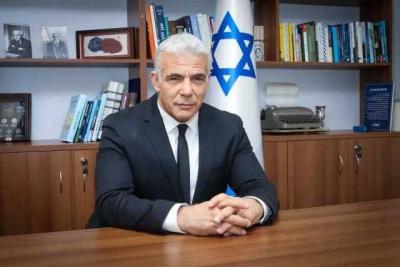Israeli Prime Minister Yair Lapid affirmed at the United Nations that the international community must use "military force" if Iran develops nuclear weapons, stressing his support for establishing a "peaceful" Palestinian state. For months, Israel has led an intensive diplomatic campaign to persuade the United States and key European powers, including Britain, France, and Germany, not to revive the international agreement made in 2015 between major powers and Iran regarding its nuclear program, officially named the "Joint Comprehensive Plan of Action."
In recent days, several officials have ruled out reviving the agreement before mid-November at the earliest, and Lapid has sought to use this window to push Western nations toward adopting a more stringent approach in negotiations with the Islamic Republic.
In his speech at the United Nations General Assembly, Lapid stated, "The only way to prevent Iran from acquiring nuclear weapons is to put a credible military threat on the table." He indicated that only then could negotiations occur with the Iranians for "a stronger and longer-lasting deal."
Lapid emphasized that Iran must be "clearly informed that the global response will not be in words but in military force if it develops its nuclear program." He assured that Israel would be ready to intervene if it felt threatened.
He stated, "We will do whatever it takes," adding, "Iran will not obtain a nuclear weapon."
The Israeli Prime Minister accused the Iranian regime of leading an "orchestra of hate" against Jews, stating that ideologues in Iran "hate and kill Muslims who think differently, like Salman Rushdie and Mahsa Amini," referencing the young woman whose death while in custody of the "morality police" sparked protests across the Islamic Republic.
Israel, which views Iran as its arch-nemesis, accuses Tehran of funding armed movements, particularly Hezbollah and Hamas.
Lapid said that despite existing "obstacles," reaching "an agreement with the Palestinians based on a two-state solution is the right choice for Israel’s security, economy, and the future of our children." He added that a "large majority" of Israelis support a two-state solution, "and I am one of them."
The Israeli Prime Minister noted, "We have one condition: that the promised Palestinian state is peaceful." His speech at the UN was leaked in Israel, exposing him to criticism from political opponents.
The U.S. President welcomed Lapid's support for a two-state solution as articulated in his UN speech. Biden stated, "I welcome the brave statement made by Lapid at the UN General Assembly; I couldn't agree more."
Israeli-Palestinian peace negotiations have been stalled since 2014. In his Wednesday speech at the UN General Assembly, Biden reiterated his support for establishing a Palestinian state but did not mention any potential peace initiative.
Lapid's current government strategy involves attempting to support the Palestinian economy without initiating a new peace process with Palestinian Authority President Mahmoud Abbas (87 years old), who will deliver a speech at the General Assembly on Friday.




